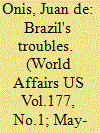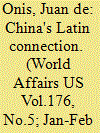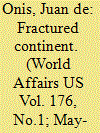|
|
|
Sort Order |
|
|
|
Items / Page
|
|
|
|
|
|
|
| Srl | Item |
| 1 |
ID:
130244


|
|
|
|
|
| Publication |
2014.
|
| Summary/Abstract |
With the extravaganza of the winter Olympic Games in Sochi over, the spotlight now turns to Brazil, the host of the FIFA World Cup championship in June. This tournament, the most widely viewed of global sports spectacles, is held every four years and involves thirty-two national teams, each of which has survived two years of regional competitions in Europe, Africa, Asia, and the Americas to reach the final play-offs. Starting on June 12th, sixty-four games will be played in four weeks, in stadiums all over Brazil, until the winner emerges in a final match on July 13th at the Maracanã, Rio de Janeiro's world-famous arena. Three million foreign fans are expected to visit Brazil, and billions of television viewers worldwide will watch the games. When the World Cup was awarded to Brazil in 2007-part of a remarkable parlay that included the award of the 2016 Summer Olympics to Rio as well-the country's economy was starting to boom as part of the BRIC upsurge that seemed ready to shake up international finance. The event was political from the onset, its significance potentially going well beyond the results on the playing fields where Brazil has won the world championship a record five times, a source of great national pride. But despite initial euphoria over being chosen to host the World Cup, Brazil is now experiencing doubts over whether it can pull off the event and second thoughts about the upsurge of influence on the international scene it was supposed to symbolize. The fervid devotion of Brazilians to soccer has made this country the Land of Football (as well as samba and Carnaval). Some non-Brazilian sports commentators have been baffled, therefore, by protest signs saying, "No to the Cup." But Brazil today is not just a land of football, it is also a land of public protests against corruption, heavy taxes, and deplorable public education and health services, cities with chaotic urban transport, markets with inflated consumer prices, and a dysfunctional political system that is manipulated by an elite for personal benefit.
|
|
|
|
|
|
|
|
|
|
|
|
|
|
|
|
| 2 |
ID:
128396


|
|
|
|
|
| Publication |
2014.
|
| Summary/Abstract |
When Brazil opened up its huge offshore petroleum discoveries to foreign developers in October, after holding off on a decision for six years, government leaks indicated that Chinese state oil companies would dominate the bidding for the estimated reserve of eight to twelve billion barrels of oil. When the bids were opened, however, the Chinese proved to be far more cautious than expected and took only a minority participation in the winning consortium dominated by Petrobras, the Brazilian state oil company, and two major Western multinationals, Royal Dutch Shell, the Anglo-Dutch giant, and Total, the largest French oil company.
|
|
|
|
|
|
|
|
|
|
|
|
|
|
|
|
| 3 |
ID:
122114


|
|
|
|
|
| Publication |
2013.
|
| Summary/Abstract |
During President Obama's years in office, the United States has pivoted toward Asia, chosen to lead from behind in the Islamic Middle East and Africa, and proposed some new trade and investment initiatives with Europe. And it has virtually ignored Latin America. US relations with its neighbors in the Western hemisphere have for the most part been by-products of its domestic policies on international drug trafficking and illegal immigration-a very weak and unimaginative agenda for a region that is walking a tightrope of conflict between populist authoritarianism and genuine democracy.
|
|
|
|
|
|
|
|
|
|
|
|
|
|
|
|
|
|
|
|
|